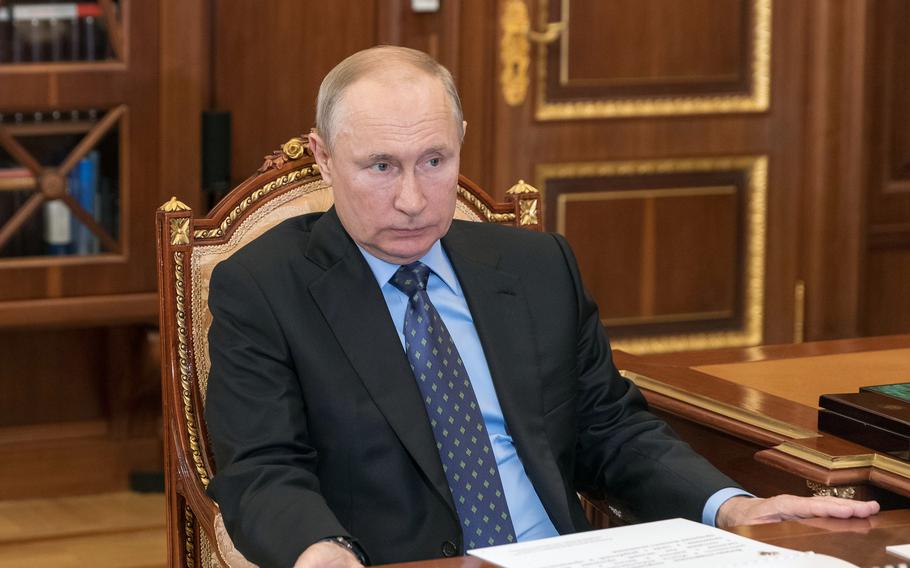
Russia's President Vladimir Putin attends a meeting at the Kremlin in Moscow on June 7, 2021. (Sergei Ilyin/TASS/Zuma Press/TNS)
(Tribune News Service) — Russian President Vladimir Putin told business leaders at his flagship economic forum this month that Russia is coping better than many other countries with COVID-19. Events increasingly are contradicting him.
Moscow on Friday reported a record-high 9,056 new COVID-19 cases, days after Mayor Sergei Sobyanin ordered mandatory vaccination for at least 2 million employees as surging infections threaten to overwhelm the capital’s hospitals. That came weeks after Putin ruled out compulsory shots, even as inoculation rates are a fraction of those in Europe and the U.S.
“We are starting to go through this story again but with more severe consequences,” Sobyanin told state television, of the intensifying epidemic. Facing “explosive growth” in infections, officials are organizing new hospital facilities “practically every day and we barely manage,” he said.
Already among the pandemic’s worst-hit countries, Russia’s experiencing a resurgence of the deadly virus aided by the rapid spread of the highly-contagious delta strain first identified in India. That has forced Moscow and St. Petersburg, Russia’s two largest cities, to restore some public restrictions just as the success of vaccination programs has prompted many U.S. and European cities to ease them.
Abroad, Russia clinched orders for hundreds of millions of doses of Sputnik V after Putin boasted of developing the world’s first COVID-19 vaccine. But a slow start to production means only a fraction has been delivered, leaving Russia trailing far behind China as a global vaccine provider and undermining its hopes of a soft-power diplomatic dividend.
To be sure, Russia isn’t alone in facing challenges from the delta variant. Prime Minister Boris Johnson on Monday delayed lifting the U.K.’s coronavirus restrictions by four weeks as cases soared, while Indonesia has tightened limits on people’s movements and Singapore scaled back reopening plans.
The surge in infections may drag on Russia’s economic recovery, according to Bloomberg Economics analyst Scott Johnson. “The loss of momentum could be more pronounced in the third quarter, depending on how the spike in virus cases weighs on demand,” he said.
Putin announced in March he’d been vaccinated and routinely appeals to Russians to follow his example by taking one of four domestically-developed shots. Only around 11% of Russians have done so, compared to vaccination rates of about 45% in the U.S. and U.K. and 27% in the European Union.
“Yes, we’re lagging behind,” Kremlin spokesman Dmitry Peskov told reporters Friday, while dismissing as “stupidity” suggestions the government’s losing the fight against the epidemic. He blamed the worsening situation on “total nihilism” among Russians in failing to protect themselves and “the insidiousness of the infection itself.”
Within days of the president’s June 4 speech in St. Petersburg, daily reported infections in Russia rose above 10,000 for the first time in three months. The number topped 17,000 on Friday, the most since Feb. 1 and higher than in the U.S. with more than twice the population.
Since the start of the pandemic, Putin has often publicly delegated unpopular decisions such as last year’s lockdown orders to regional governors in an attempt to minimize political fallout for the Kremlin.
The head of the state-run Gamaleya institute that developed Sputnik V, Alexander Gintsburg, pleaded with Putin to adopt tougher methods to increase the pace of vaccination at a June 12 Kremlin meeting.
“Democracy is a great thing but it has nothing to do with people’s health,” he said.
“The situation is deteriorating very fast,” said Alexei Raksha, a demographer who left the state statistics agency last year after a dispute over its coronavirus numbers. “If the pandemic really takes off now, we’ll have a lot of deaths.”
The authorities aren’t expecting relief any time soon. Election officials laid out plans Friday for voting in key parliamentary elections in September to take place over three days to reduce contagion risks.
“They want to avoid scaring people, they want them to come to the elections in an optimistic mood,” said Tatyana Stanovaya, founder of political consultancy R.Politik.
The failure of its inoculation campaign at home has done little to help the Kremlin’s pitch for international acceptance of Sputnik V.
Despite pledges by Russia to supply shots for almost one in 10 people on the planet this year, foreign markets are finding themselves chronically under-supplied.
Mexico complained last month that production delays are leading to a shortage of the second of Sputnik’s two shots. In Argentina, opposition lawmakers challenged the health minister to explain why less than a fifth of vaccinated people have had both shots.
Dozens of countries have approved Sputnik V for use, including EU members Slovakia and Hungary. The European Medicines Agency is reviewing an application to authorize the vaccine for use across the 27-nation bloc.
The Russian Direct Investment Fund, which is in charge of Sputnik V’s international roll out, insists everything is on track to meet demand. Agreements between RDIF and 25 production facilities in 14 countries will allow for 1.6 billion doses to be produced this year, a spokeswoman said.
“Making a large global impact is already too late because there is such a high vaccine production from other countries,” said Rasmus Bech Hansen, founder and CEO of Airfinity, a London-based science analytics company. “The Russian leadership has an opportunity to protect its own population first.”
___
©2021 Bloomberg L.P. Distributed by Tribune Content Agency, LLC